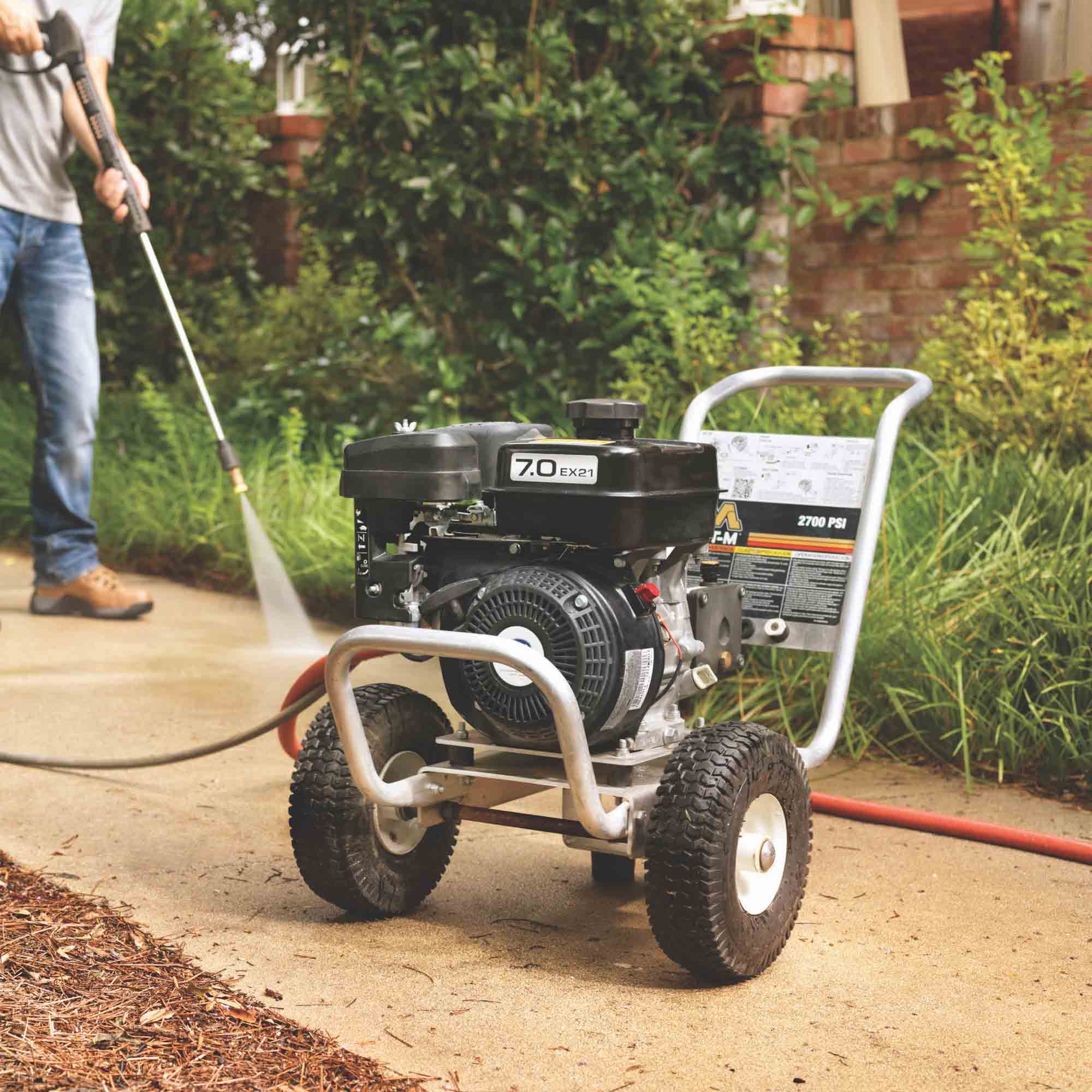Gas pressure washers are generally more powerful and better for heavy-duty tasks. Electric pressure washers are quieter, lighter, and more suitable for light cleaning jobs.
Choosing between a gas or electric pressure washer depends on your cleaning needs and preferences. Gas models typically deliver higher pressure and flow rates, making them ideal for large areas and tough grime. They excel in outdoor settings where mobility and power matter.
On the other hand, electric pressure washers offer convenience and ease of use for smaller tasks around the home. They are perfect for cleaning patios, vehicles, and siding without the hassle of fuel. Understanding your specific requirements helps you make the right choice for effective cleaning.
Page Contents
- 1 Introduction To Pressure Washers
- 2 Key Features Of Gas Pressure Washers
- 3 Key Features Of Electric Pressure Washers
- 4 Comparing Durability And Maintenance
- 5 Environmental Impact And Energy Efficiency
- 6 Cost Analysis
- 7 Suitability For Different Cleaning Tasks
- 8 Safety Considerations
- 9 Making The Right Choice
- 10 Frequently Asked Questions
- 11 Conclusion
Introduction To Pressure Washers
Pressure washers play a vital role in home maintenance. They help clean surfaces efficiently. Two main types are gas and electric pressure washers.
Gas pressure washers are powerful and ideal for tough jobs. They work well on large areas. These machines require more maintenance and can be noisy.
Electric pressure washers are quieter and easier to use. They are great for small tasks like cleaning patios and cars. They require less maintenance but may lack power for heavy-duty tasks.
| Feature | Gas Pressure Washers | Electric Pressure Washers |
|---|---|---|
| Power | High | Medium |
| Noise Level | Loud | Quiet |
| Maintenance | High | Low |
| Portability | Less portable | More portable |

Credit: www.reddit.com
Key Features Of Gas Pressure Washers
Gas pressure washers offer more power and performance than electric models. They can clean tough stains quickly. These machines generate higher pressure, making them ideal for heavy-duty jobs. They are best for large areas and outdoor tasks.
Portability is a key feature of gas pressure washers. They are not limited by power cords. Users can easily move them around, making them great for outdoor use. Many models have wheels for easy transport.
For outdoor cleaning tasks, gas pressure washers excel. They can run for hours without needing a recharge. This allows for uninterrupted cleaning sessions, especially in large spaces.
Key Features Of Electric Pressure Washers
Electric pressure washers are known for their ease of use. They are often lighter and easier to move around. Simply plug them in and start cleaning. No need for fuel or complicated setups.
Another benefit is their quiet operation. Electric models run much quieter than gas ones. This makes them perfect for residential areas. You can clean without disturbing your neighbors.
:strip_icc()/bhg-pressure-washer-garden-103089701-35dcee8ed7dd4100805a5bdaee9234a7.jpg)
Credit: www.bhg.com
Comparing Durability And Maintenance
Gas pressure washers usually last longer than electric models. They can run for 10 to 15 years with proper care. Regular maintenance is key. This includes changing the oil and cleaning the air filter. Always check the fuel system to avoid issues.
Electric pressure washers are easier to maintain. They have fewer moving parts. Their lifespan is around 5 to 10 years. Keeping them clean and stored properly helps them last longer. Regularly check the power cord and connections for safety.
Environmental Impact And Energy Efficiency
Gas pressure washers produce harmful emissions that can affect air quality. These emissions contribute to air pollution and climate change. They release carbon dioxide and other toxins into the atmosphere. This can harm both human health and the environment.
On the other hand, electric models are much more sustainable. They produce zero emissions during operation. This helps keep the air clean and reduces overall pollution. Electric washers also use less energy compared to gas models.
Choosing electric models supports a cleaner, greener future. They are quieter and safer for residential areas. This makes electric washers a smart choice for eco-conscious consumers.
Cost Analysis
The initial investment for a gas pressure washer is typically higher than for an electric one. Gas models often cost between $300 to $800. Electric pressure washers range from $100 to $300. This difference is mainly due to the engine power and durability.
Long-term expenses can also vary. Gas pressure washers need more maintenance and fuel. This can add up over time. Electric models usually have lower running costs. They require less maintenance and no fuel. Overall, consider both costs carefully before making a choice.
Suitability For Different Cleaning Tasks
For home use, electric pressure washers are often the best choice. They are quiet and easy to start. These washers are perfect for cleaning cars, patios, and furniture. They are also lightweight, making them easy to move around.
For commercial and heavy-duty cleaning, gas pressure washers excel. They provide more power and can handle tough jobs. Cleaning large areas like driveways and buildings becomes easier with gas models. They are also better for removing stubborn stains and dirt.
| Type | Best For | Pros | Cons |
|---|---|---|---|
| Electric | Home Use | Quiet, Lightweight, Easy to Start | Less Power, Limited Range |
| Gas | Commercial Cleaning | High Power, Handles Tough Jobs | Heavy, Noisy, More Maintenance |

Credit: m.youtube.com
Safety Considerations
Operating gas pressure washers requires special care. Always wear safety goggles and gloves. Keep a safe distance from people and pets. Make sure to use them in well-ventilated areas. Check for fuel leaks before starting. Turn off the engine when not in use. Avoid using gas washers near flammable materials.
Electric pressure washers are generally safer. Always check the power cord for damage before use. Keep the unit away from wet areas to prevent electric shock. Use a ground fault circuit interrupter (GFCI) for extra safety. Never operate the washer in rain or snow. Unplug the unit when changing nozzles or making adjustments.
Making The Right Choice
Choosing between a gas or electric pressure washer depends on your needs. Gas models usually provide more power, making them great for tough jobs. They work well for large areas, like driveways and patios.
On the other hand, electric washers are quieter and lighter. They are perfect for smaller tasks, such as washing cars or decks. These models are easier to maintain and often cheaper to buy.
| Type | Pros | Cons |
|---|---|---|
| Gas | More power, suitable for big jobs | Heavier, requires more maintenance |
| Electric | Lightweight, low maintenance | Less power, limited to small tasks |
Frequently Asked Questions
Which Is Cheaper: Gas Or Electric Pressure Washers?
Electric pressure washers are generally cheaper upfront. They require less maintenance and have lower operating costs. However, gas models may provide more power for heavy-duty tasks. Ultimately, the cost-effectiveness depends on your specific cleaning needs and frequency of use.
How Much Power Do Gas Pressure Washers Have?
Gas pressure washers typically offer between 2,000 to 4,000 PSI. This power is ideal for tougher jobs like removing oil stains or cleaning driveways. They are designed for heavy-duty tasks where high pressure is essential. Thus, they are suitable for professional use or larger residential projects.
Are Electric Pressure Washers Effective For Home Use?
Yes, electric pressure washers are effective for most home tasks. They are perfect for cleaning patios, decks, and vehicles. While they may lack the power of gas models, they are sufficient for regular cleaning needs. Their ease of use and lower noise levels make them ideal for homeowners.
What Maintenance Do Gas Pressure Washers Require?
Gas pressure washers require regular maintenance to ensure longevity. This includes changing the oil, checking air filters, and replacing spark plugs. You should also clean the water inlet filter and inspect hoses for wear. Regular upkeep can prevent costly repairs and extend the life of the machine.
Conclusion
Choosing between gas and electric pressure washers depends on your specific needs. Gas models offer more power for heavy-duty tasks. Electric versions are quieter and easier to maintain. Consider your cleaning requirements, budget, and convenience before making a decision. Both options can effectively tackle dirt and grime with the right approach.

